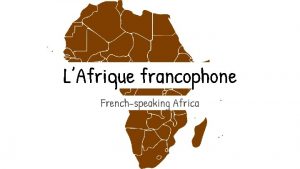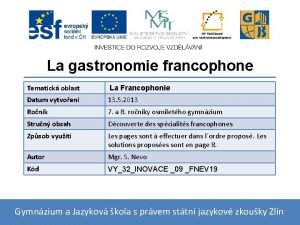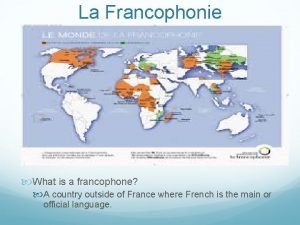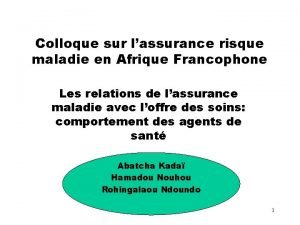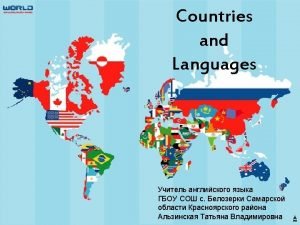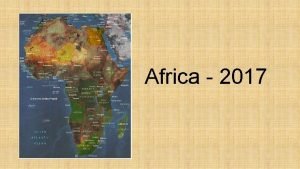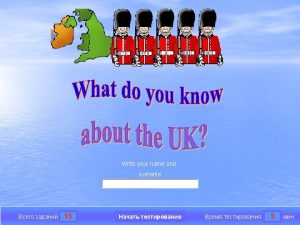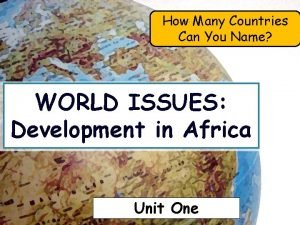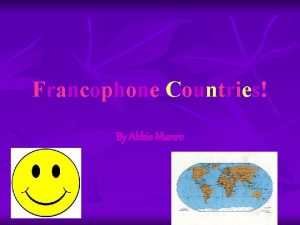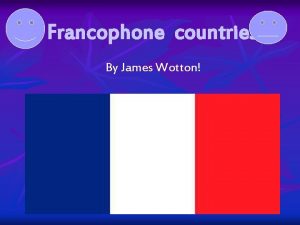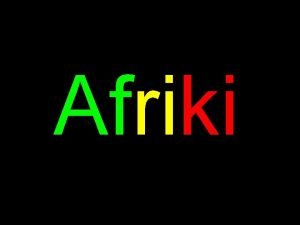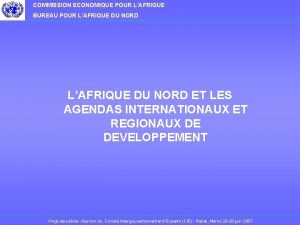LAfrique francophone Frenchspeaking Africa How many countries in








- Slides: 8

L’Afrique francophone French-speaking Africa

How many countries in Africa speak French? Make a guess! Combien de pays en Afrique parlent français ? Tu devines !

Combien de pays en Afrique parlent français ? Vingt-neuf pays ! 29 countries ! Tu étais juste ? Were you correct ?

Okay, but why do these 29 countries speak French? This is a result of 2 major things: French colonialism and the Scramble for Africa. What is colonialism or colonisation? This is when one country decides to forcibly take the land from another group of people and force the people living there to live under their control. Historically, colonisers enslaved many people. This was done through violence and war. The colonisers usually wanted the land for profitable resources, like cotton, and decided that they would steal these resources and sell them to other countries instead of trading with the people who already lived there. In short, colonisation is “the policy or practice of acquiring full or partial political control over another country, occupying it with settlers, and exploiting it economically. ” (Oxford English Dictionary) You can highlight the bits you think are important!

The French Colonial Empire officially began with the establishment of a port in the Americas in 1605. The port was located in what is now Nova Scotia, and in 1608 a colonist, Samuel De Champlain, founded Québec on the native Innu and Algonquin tribes’ land. In order to found the land in the name of France, the Native Americans living there were forced out of their homes or killed so that the French could build their own homes and establish a fur trade, selling the fur of native animals of the area. As their greed grew, France began to colonise further, moving to islands in the Caribbean (West Indies). In order for France to make as much money as they could off of the sugar crop on these islands, they kidnapped people from Africa and enslaved them. During this time, they transported nearly 2 million enslaved people to these islands to force them to work. Many of these slaves came from Senegal in West Africa where the French had taken land to establish a trading post in 1624. In 1830, they continued to extend their empire by attacking and seizing Algeria in North Africa, beginning what would be a 132 year rule ended by the Algerian War for Independence. How slaves were transported on ships. They were shackled and unable to move. Over 210, 000 of the people the French enslaved died while on these ships. You can highlight the bits you think are important!

1884 – 1885: The Scramble for Africa Click on the map for a bigger picture. The Scramble for Africa consisted of the invasion, occupation, division and colonisation of Africa by European powers - this included: Belgium, France, Germany, Italy, Portugal, Spain, and the United Kingdom. These European powers wanted to extend their control and wanted to profit off of the many natural resources Africa offers (diamonds, sugar, salt, iron, gold, petroleum, cocoa beans, different woods, etc. ). Each European country also wanted to become more powerful than each other. In 1884, these countries had a conference in Berlin without the input of any African people or leaders. These countries had become colonial powers through the slave trade, trading of resources, and military acts worldwide. They decided that they would meet and decide who got which bits of Africa, partitioning the continent instead of going to war to decide which European country would get which areas of land. They drew the borders of these new countries, drawing the borders around the resources and landmarks that they each wanted, such as mountains and rivers, and without consideration of the people already living there or the different tribes already in place. You can highlight the bits you think are important!

France’s colonial history These lands where France deployed violent force, enslaved people, and took their land so that France could profit are where many people still speak French today. Many of these are now independent after fighting for their independence, but France does still control some of its former colonies. In Africa, the former colonies include: Morocco, Algeria, Tunisia, Ivory Coast, Benin, Mali, Niger, Guinea, Mauritania, Senegal, Burkina Faso, Togo, Nigeria, Gambia, Chad, Central African Republic, The Republic of Congo, Gabon, Cameroon, São Tomé and Principe, Madagascar, Mauritius, Djibouti, Seychelles. Mayotte and Réunion remain French. It is also important to note that when the French took the resources from these lands, they sent the money to France. This means the people living in these countries were often left worse off because their resources had been exploited and they were not able to protect their land resources, nor were they able to make money off of them because the French would take it all. This caused a number of economic issues that affect many of these countries in the present day. You can highlight the bits you think are important!

What you learned: Copy & respond to the questions below. Be prepared to discuss in class. 1. How many countries in Africa speak French? 2. In your own words, why do they speak French? 3. In your own words, how would you define colonialism? 4. About how many slaves on French ships died during the passage from Africa to the West Indies? 5. Why did the European countries want to steal the land from the people living in Africa? Extra: Did anything you learn surprise you?
